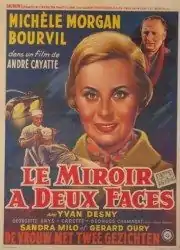| Le Miroir à deux faces | |
|---|---|
 | |
| Directed by | André Cayatte |
| Written by | André Cayatte Gérard Oury dialogue: Jean Meckert Denis Perret |
| Produced by | Henry Deutschmeister Alain Poiré Robert Sussfeld (executive producer) |
| Starring | Michèle Morgan Bourvil Ivan Desny |
| Cinematography | Christian Matras |
| Edited by | Paul Cayatte |
| Music by | Louiguy |
Production companies | CEI Incom Franco London Films Paris Union Films Société Nouvelle des Établissements Gaumont (SNEG) |
| Distributed by | Société des Etablissements L. Gaumont |
Release date |
|
Running time | 96 minutes |
| Countries | France Italy |
| Language | French |
Le Miroir à deux faces is a 1958 French drama film directed by André Cayatte who co-wrote screenplay with Gérard Oury, Jean Meckert and Denis Perret. The film stars Michèle Morgan, Bourvil and Ivan Desny. It was called The Mirror Has Two Faces in English, but this is not the literal translation; the word is à ("with") not a ("has"), and so would be better translated as The Two-Sided Mirror.[1]
The film was loosely remade in the U.S. as The Mirror Has Two Faces (1996) adapted by Richard LaGravenese, and starring Barbra Streisand and Jeff Bridges.
Synopsis
Pierre Tardivet, a professor, marries Marie-José Vauzange, a sensitive and intelligent girl who is physically unattractive. Tardivet soon begins to treat Marie-José cruelly, making her life very unpleasant and joyless. Two children are born from the marriage. Then, Tardivet suffers a car accident and is tended by Dr. Bosc, a famous plastic surgeon. Bosc operates on Marie-José and transforms her into a beautiful woman. Tardivet then begins to treat her even more cruelly. He becomes embittered and hateful towards Marie-José because her changed appearance makes him think she is no longer his. Marie-José and her sister's husband, Gérard Durieu, want to elope and restart their lives, but they are stopped when Pierre Tardivet kills Dr. Bosc. This dramatic act recalls Marie-José to her duties as a wife and mother, and she renounces her happiness to tend to her husband and children.
Cast
- Michèle Morgan - Marie-José
- Bourvil - Tardivet
- Ivan Desny - Gérard
- Elizabeth Manet - Véronique
- Gérard Oury - Dr. Bosc
- Sandra Milo - Ariane
- Georgette Anys - Mme. Benoit
- Julien Carette - M. Benoit
- Georges Chamarat - M. Vauzanges
- Jane Marken - Mme. Vauzanges
- Sylvie - Mme. Tardivet
Critical reception
Time Out wrote: "Interesting to re-view this in the light of the Streisand 'remake', though any resemblance are so superficial as to appear coincidental," and added that "Cayatte shows his customary relish for the unpleasant: the nightmare honeymoon in Venice is richly detailed and Sylvie sketches in the quietly venomous mother-in-law with her usual economy. If Streisand's film was quintessential '90s Hollywood feel good, this is equally characteristic '50s French astringency."[2] TV Guide commented: "The filmmakers do a fine job of delving into the problems people face when a fairy tale-like transformation takes place, though the film suffers from an over-analysis of the situation. Also, Morgan is too glamorous to pull off the type of physical transformation that occurs."[3]
References
- ↑ Mordden, Ethan (11 April 2019). On Streisand: An Opinionated Guide. Oxford University Press. ISBN 9780190651770 – via Google Books.
- ↑ "Le Miroir a deux faces". Time Out London. Retrieved 2019-10-12.
- ↑ "The Mirror Has Two Faces | TV Guide". TVGuide.com. Retrieved 2019-10-12.
External links
- Le Miroir a deux faces at Films de France
- Le Miroir a deux faces at Alice Cineme
- Le Miroir à deux faces at IMDb
- Le Miroir à deux faces at AllMovie